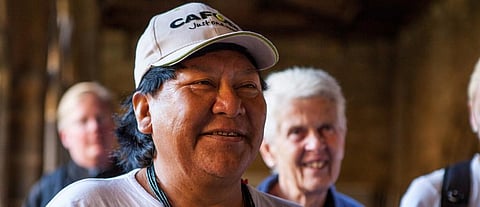‘The Yanomami need the world’s support to bring pressure on Bolsonaro’
Have you heard of the ‘Dalai Lama of the Rainforest’? Meet Davi Kopenawa, a shaman of the Amazonian Yanomami tribe. Kopenawa has led his people’s 20-year campaign to protect their territory in Venezuela and Brazil — the largest rainforest area under indigenous control in the world.
Davi has frequently been threatened by gold miners and politicians targetting resources inside the Yanomami territory. He received last year’s Right Livelihood Award — the ‘Alternative Nobel’ in Stockholm, Sweden.
Down To Earth spoke to him about his life and the status of the Amazon. Edited excerpts:
Rajat Ghai: The Yanomami territory is split between Brazil and Venezuela. Does the tribe recognise borders created by non-indigenous people?
Davi Kopenawa: The forest does not belong to the Yanomami, they merely live in it: That is what the mendacious white men think. But they do not own the forest either. They only know how to destroy it.
The true owners of the forest are the xapiripë spirits. They dwell in it, the mountains are their houses. The spirits of our animal ancestors and of the forest are the true owners of the woods. They play all over the mirrors of the forest.
RG: Many of your tribe, including your parents, died due to the diseases brought by the miners. How old were you then? How did you muster the will to move forward in life?
DK: My family died from measles — my uncle, my mother, sister, cousin, nephew. I remember the Yanomami who lost their lives. I can’t forget this. I was very sick, but I didn’t die.
I think Omame (the creator) protected me so I could tell the world this story. I fight because I am alive. I believe in my fight. I am fighting for the young, for the children, and also for the adults, that my people may not have to die so young.
RG: What is your response today to past critiques by late American anthropologist Napoleon Chagnon that ‘the Yanomami lived in a state of chronic warfare’?
DK: During my faraway travels to the white people’s land, I have sometimes heard them claim that we are warlike and that we spend our time shooting arrows at each other. Obviously, the people who say things like that do not know us and they are mistaken or lying.
We Yanomami have no liking for what the white people call ‘war’ in their language. They blame us for arrowing each other, but they are the ones who really make war.
We certainly don’t fight with the same harshness as they do. They fight in huge numbers, with bullets and bombs that burn down all their houses. They even kill women and children!
The white people, ultimately, are the truly fierce ones! When they fight wars, they throw bombs everywhere and don’t think twice about setting fire to the earth and sky. I have watched them, on television, fighting over oil with their planes. It worried me a lot and I said to myself, ‘Hou! These people are so warlike and dangerous!’
RG: Do you think activism by indigenous and other activists can stop Jair Bolsonaro from destroying the Amazon?
DK: I need the world’s support, to bring pressure on the government. Don’t leave us alone to fight. Continue to fight and put pressure on the Brazilian government.
It is important to me that this news goes to other countries, so other people see and look and read about what happened in Brazil to the Yanomami people. We need you to bring your strength to bear to make them demarcate our land, to recognise our continuous area, our single and indivisible territory.
Rajat Ghai: What are your early recollections of your forest home, before the gold miners came to Yanomami territory?
Davi Kopenawa: A long time ago, my grandparents, who lived in Mõramahi araopë, a house very far, on the headwaters of the Toototobi river. They sometimes visited other Yanomami established in the lowlands along the Aracá river.
In the early times, human beings were very numerous in this land. That's what our old ones say. There were no dangerous diseases, measles, the flu, malaria.
We were alone, there were no garimpeiros (miners) to burn gold, factories to produce iron and gasoline, cars and airplanes. The forest and those who lived in it were not ill all the time.
It was only when the whites became very numerous that their smoke-epidemic xawara (contagious disease) began to increase and to spread all over. That evil thing became very powerful and that’s how the peoples of the forest began to die.
When they lived without the whites, our ancestors didn't have factories, they hunted and worked in their fields to make their food grow. They also didn't make all the rivers dirty like those whites that now look for gold in our lands.
RG: Will your winning the ‘Alternative Nobel’ last year help in putting the plight of the Amazon’s indigenous peoples in the spotlight?
DK: I am very happy that the RLA prize people didn’t forget me. They trust me and Hutukara (Yanomami Association) and those who defend the forest and Planet Earth. This award is a new weapon to strengthen the fight of our people, and to carry on defending the soul of the Amazon.
Survival International’s Brazil wing translated Davi’s replies from Portuguese to English for Down To Earth


